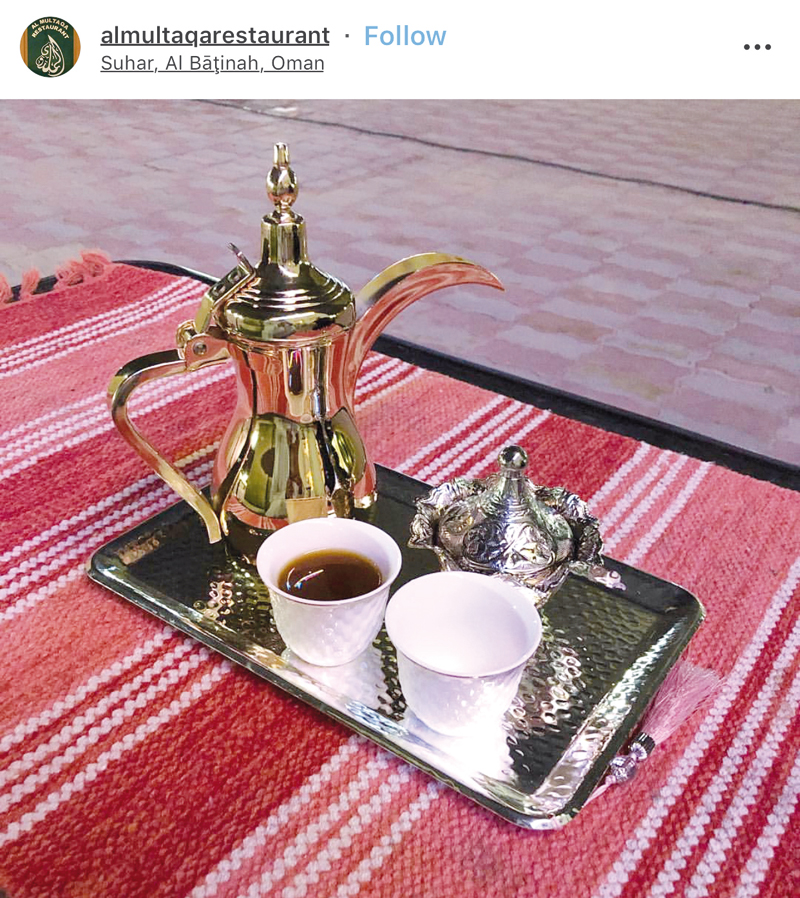

Whether a resident or visitor, you haven’t experienced Oman until the moment you taste your first cup of Qahwa. An integral part of the Omani culture, qahwa is the perfect representation of the famously known Omani hospitality — a complete course that reflects the exceptional, warm and welcoming essence of the Omani heritage.
What is Qahwa?
Qahwa (or kahwa) is the Arabic word for coffee and Arabic coffee is unique not only in its taste but how it is prepared and served. Freshly brewed on the daily, the thundering sounds of manual grinding, up until the fragrant aroma of freshly made coffee wafts through the house and to the serving along with its sides— Qahwa in Oman is more than just coffee.



qahwa in Oman refers to what guests are served when they are invited to an Omani house, it includes the Omani coffee, a variety of Omani dates, fresh and dried fruits, Omani halwa along with other baked and fried goodies. The offering of qahwa is almost ritualistic and a direct representation of the warmth and welcoming nature of the Omani people.
How qahwa is made?
Omani qahwa uses spices and flavours to give a unique taste to the coffee. The main ingredients include saffron, rose water and cardamon, whilst some others also like to add cloves and cinnamon.
Although coffee isn’t natively grown in the region, the Sultanate’s rich history and prevalence as an ancient trading route meant the people of Oman developed a taste for coffee many centuries ago. Once the green beans make their way into the local souqs and into the Omani homes, the process of making the perfect pot of qahwa begins. First, the beans are roasted until they become a rich, dark colour and then moved into a stone mortar and pestle to be ground into a fine powder along with a combination of spices and herbs. Once ready, the mixture is added to boiling water and boiled together until it forms the dark, delicious drink that we all love and know as qahwa. The recipe of every family’s qahwa is like an heirloom that is passed down generations, although, with globalization and the easy availability of instant coffee, it isn’t uncommon to find these families still going through the painstaking job right from scratch to produce their traditional qahwa.
What to do when invited for Qahwa?
the Omani people are known for their generosity and hospitality, they love inviting people to their houses, and serving them with their best food, desserts and drinks and sharing their culture and heritage with those willing to learn about it. In return for their hospitality, here are some things to keep in mind when you get invited.
Omanis respect punctuality and are very organized, so a guest should always be punctual.
Omanis usually sit on the floor in a circle, where the food is in the middle, they sit close to each other and make guests feel welcomed and treated like family. You can ask to sit on a chair if you can’t sit on the floor for a long time. Make sure that you don’t eat before you visit, because they will offer you a lot of food and it is disrespectful not to eat what they offer, but more importantly, they feel joy when someone from a different culture enjoys what they have to offer.
What to expect?
The traditional course of hospitality in Oman usually starts with qahwa and dates. Beside the dates bowl, there will be a water bowl. You should gently wash your fingers in that bowl before you start eating dates. Then, the host will serve coffee in a small cup. If you want another cup of coffee, you simply give your cup to the host. If you don’t want to drink anymore, make sure you shake your cup before you give it back to the host. Fruits are t served with other desserts like cakes and Omani bakeries, however, the coffee and dates will remain until the end of the visit. Locals take great pride in their coffee, is it a must to offer it all visitors, and during weddings and special occasions. Qahwa represents a sign of love and respect and must be served at all times. During weddings, qahwa is served with Omani halwa, with tradition stating that guests should eat the halwa first before drinking the coffee. So keep these things in mind and be sure to enjoy your next cup of qahwa along with its rituals.
Oman Observer is now on the WhatsApp channel. Click here



